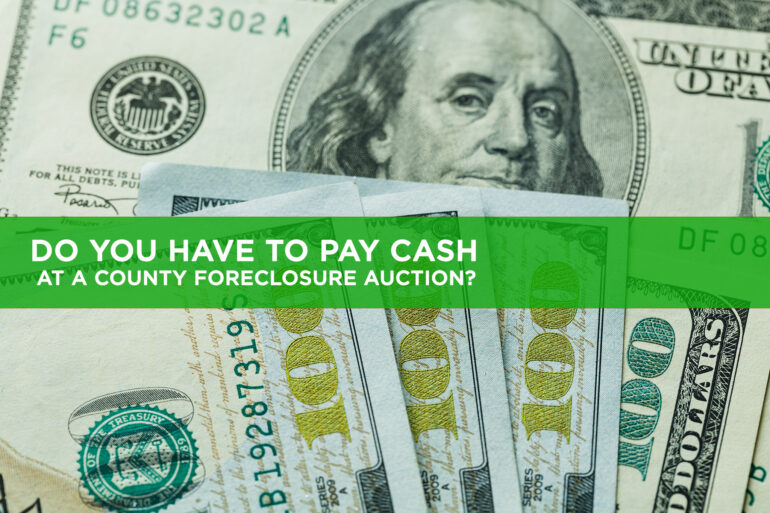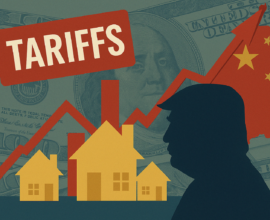Do You Have to Pay Cash at a County Foreclosure Auction?
One of the first things that comes to mind when buying a house is financing. While there is a variety of mortgages to choose from in a traditional sale, distressed properties are less straightforward.
How “Cash-Only” Works at Foreclosure Auctions
Foreclosure and tax deed sale properties are “cash-only.” Many first-time investors balk upon hearing that they cannot finance the purchase or make any kind of ongoing payments.
Investing through county foreclosure auctions seems unattainable to those without a large savings account. The auctions are set up in a way that the entire process takes such a short amount of time that traditional mortgages would be impossible.
Prior to the auction, you will need to deposit 5% of your maximum intended bid with the county clerk of courts. Should you win, the funds apply immediately to the purchase of the property. Once you have won the auction, the clock starts ticking and you have until the following business day (the cut-off time varies by county) to post the remaining 95%.
Should you not be able to pay for the property in its entirety by the deadline, you forfeit your 5% deposit.
Why Traditional Mortgages Don’t Cut It
This process moves at such a brisk pace that it cannot be slowed down by the lengthy and complex protocol that mortgage companies must follow.
Also, foreclosures and tax deed sales cannot be inspected, as they most likely remain under the original ownership of the defendant. You cannot bring an inspector to a home that you do not have access to, and no mortgage company will take on the risk of an investment that has not been inspected to their standards.
On that same note, mortgage companies require title insurance. Many auction properties are not eligible for title insurance as they are distressed properties that are often encumbered. Ordering a title search report is imperative in doing your due diligence, and it will allow you to be fully aware of any potential issues on the property. However, a title search is not enough to convince a mortgage company that the title is risk-free.
Once you have won either a tax deed sale or a foreclosure auction, you could do a quiet title action and eventually obtain title insurance and a marketable title. However, the acquisition of the auction property itself must be paid for upfront by the following business day.
Financing Options for Foreclosure Auctions
Even though you cannot secure a mortgage for properties sold at county auctions, there are other options.
Hard Money Lenders
Hard money lenders are one resource that provides financing. Unlike mortgages, however, they will not lend towards a hypothetical bid on a property at an auction. Instead, they provide financing for the repairs and restoration. Their borrowing terms can be shorter and at a higher rate than traditional financing.
Whereas a mortgage is catered around the needs of someone wanting to purchase a home and pay it off gradually over the course of decades, hard money lenders are often short-term with higher interest rates. Investopedia.com states that the loan-to-value ratio for hard money lenders is significantly lower than traditional loans (50-70% of the property’s value) with APRs that can range from 5-11%.
The funding is provided by investors or lending companies, and that’s why the interest tends to be higher. These loans are ideal for someone who wants to fix and flip homes as the turnaround time for their investment can be much shorter than for buy and hold investors.
The lender will profit by collecting the interest, or the property itself if you do not repay the loan. Therefore, they will often base their decision to lend to you more on the collateral (the value of the property) and less on your actual credit.
Private Lenders
Private lenders are similar to hard money lenders in that they are both private entities that provide short-term loans for real estate properties. However, private lenders are more often individual real estate investors who provide loans on the side and not as their main source of revenue.
Hard money lenders are often officially licensed to loan money and private lenders are usually unlicensed. Private lenders may be more willing to hear out your plans and work with you, but their terms will be similar to hard money lenders. It is in your best interest to shop around and get the terms for several hard money lenders and private lenders so you can analyze the pros and cons of each one.
PropertyOnion.com has a convenient list of private and hard money lenders to choose from. A positive relationship with a private lender could serve as a valuable asset for your investment goals.
HELOCs
Another common option for buying auction properties is to leverage the equity in any of your existing properties. With a HELOC, you can withdraw either a lump amount or a line of credit, which you can then use to purchase your investment property or even to fund the rehabilitation of the property. According to Zillow.com, HELOC rates are usually around 6.39%. However, HELOCs are “adjustable rates” and therefore are subject to increase.
Be sure to research whether a HELOC would be beneficial for you compared to a private lender or cash out refinance.
Cash Out Refinance
A “cash out refinance” is also based on your existing mortgage. Instead of borrowing against the equity that is already in your home, you extend out the borrowing term of your mortgage.
According to RocketMortgage.com, you can qualify for this option if you have a debt-to-income ratio of less than 50%, a credit score higher than 620, and enough equity to validate the refinance.
Your Own Savings
Depending on your current financial situation and the research you put into the prospective property, you may not need to secure financing at all.
There are many investors who have found properties at county auctions that were attainable for their budget. However, you should be aware that properties that appear to be “too good to be true” may be encumbered by other liens or require expensive membership fees such as in the case of country club HOA fees for condominiums.
By carefully researching both the property and the title, learning successful bidding strategies, and understanding the auction process, you may be able to pay for an auction property with the savings you already have, borrowing little to nothing. It is important to note that this scenario requires time, patience, and a willingness to learn.
Even though it takes some careful planning, you can acquire auction properties at such fantastic discounts that they are often worth the time and energy required. While a mortgage company won’t take on the liability of a distressed property, if you do your due diligence, you can minimize the risk for yourself and maximize the reward.
Title searches are an essential step in this, as well as analyzing all of the information on PropertyOnion.com’s Property Details Page. Go over the tax values and PropertyOnion.com valuation numbers with a fine-toothed comb. Book a consultation with a recommended real estate attorney.
Be sure you fully understand the terms of whatever financing you opt for, whether it is from a private lender or a HELOC.
Don’t Dismiss Cash-Only Foreclosure Auctions
Florida foreclosure auction sales are “cash-only,” but that does not mean they are automatically off limits to you. There is a vast number of educational resources online written by experts that can advise you on an abundance of financing options.
The “cash only” aspect of county foreclosure auctions is a deterrent to many people, but once you have found the right resource for you, there is no reason why it should slow you down.









Excellent article. Lisa how can I reach you. In the process of considering buying a home in foreclosure, I have never done this before…it has been touch and challenging. can you be kind enough to give me a call. Tks Patricia Gray
Of course. I will call you this afternoon.